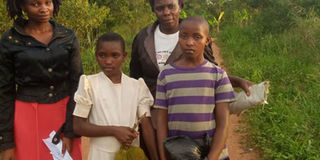A teacher rooting for the girl child

Namaalwa (in black and Red) Namaalwa believes a lot needs to be done in rural communities in shading light on the value and relevance of education, and more so, the education of the girl child. Courtesy photo
Having grown up in hands of mentors and different people who didn’t even know her but had the will to help and selflessly offer moral grooming to her, it was always her purpose to find an opportunity to serve other young people. She found that opportunity with Teach for Uganda, where she volunteered to be trained as a teacher.
She was later stationed in Luweero District, to serve a less privileged community at a local Anglican founded school, Naloongo Church of Uganda primary school this year, teaching the English language.
“Everytime I walk to class, I plan and deliver my lessons in a child-centred approach. I believe in inspiring the next generation of self-driven learners who are going to be agents of social change and policymakers. And as I teach, I encourage critical thinking, innovativeness, and endeavour to impart real-life problem-solving skills,” she shares.
Empowering the girl child
However, her advocacy for the education of the girl child gets more pronounced outside the four corners of the classroom.
“I believe every child matters regardless of their gender and it is unexplainably disturbing how some parents and communities under look the potential of a girl child,” Namaalwa is convinced and due to her keen eye towards the education of girls in the community, almost two months ago, she rescued two young girls who had run away from their home.
Namaalwa narrates that, abandoned by their father at an infant age due to alcoholism, the two girls ( Jane Kobusingye, 11-years-old - stopped in Top Class and Sylvia Natasha 12-years-old, stopped in P.3 ) stayed in the care of their mother who kept ferrying multiple partners into their small house in Mubende District. Their aunt who now lives in Nalongo village in Luweero District (where Namaalwa teaches) picked them from their mother, with hope for an education.
Little did they know that they would become graduated maids to her, with an overloaded routine of digging, hawking milk and grazing cattle for her, with no access to school for three years. This pushed then to run away from their auntie’s home to the bush where they sought refugee for close to a fortnight.

Namaalwa draws motivation from seeing every individual learner improve day by day both academically and socially. COURTESY PHOTO
“One evening when I was going to visit the home of one of my pupils, I met these girls; all drained, terribly wounded, shy and hopeless in appearance. I stopped and engaged them. After minutes of talking to them, I realised they were going through such a tough time,” she adds.
As a leader, she felt they deserved to be under good parentage, have rights to shelter, food and education. She immediately altered her plans for the evening to take them to the LC 1 chairman and later, engaged their aunt who noted that the best she could offer was shelter. Namaalwa has now taken on the burden, to devise all means of having them go back to school.
“If educated, girls too have the potential to serve the nation effectively and so, they deserve the right to shelter, food and education. I wasn’t just rescuing girls, I was rescuing the future great leaders of this nation. I recognise that some parents are vulnerable and can’t afford to care for their children and so, my call goes out to good samaritans who can sacrifice the little they can to help these innocent children,” she pleads.
Motivation
Since she teaches in a disadvantaged community, Namaalwa draws motivation from seeing every individual learner improve day by day both academically and socially. “As a teacher, you can’t stop smiling when a learner improves their grades even by two per cent or just as an individual in attributes like confidence, transparency, teamwork, and having a sense of possibility,” she explains
In conclusion, Namaalwa believes a lot needs to be done in rural communities in shading light on the value and relevance of education, and more so, the education of the girl child.
“Some people still think and feel it is a waste of time, money and so, need to be sensitised, which we are already doing. Secondly, some of these learners countlessly face challenges of early pregnancy/marriage, dropping out of school and parental negligence. But even those that make it to school have no exposure or role model that gives them a reason to believe in education. But with consorted efforts of us, the teachers, government, civil society organisations and NGOs, we can fully achieve this,” she says.
Background
Namaalwa went to St. Kizito Sabina Day and Boarding Primary School in Rakai, to St. Johns Senior Secondary School, Bweyogerere Ntebetebe for O level and Namungoona Parent’s SSS for A-Level both on scholarship. She thereafter pursued her Bachelors in Gender and Women’s studies at Makerere University sponsored by MasterCard foundation. She is a current fellow with Teach for Uganda.



